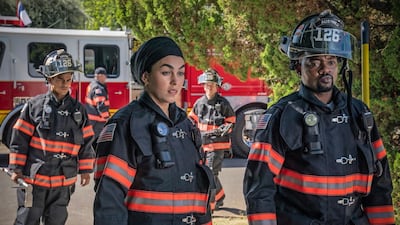A short clip from an episode of Fox's television series 9-1-1: Lone Star all of a sudden resurfaced on Twitter this week.
The episode may have first been broadcast in January, but that certainly doesn't mean the issues it raises are no longer relevant.
The clip in question has drawn harsh criticism about the depiction of the show's Muslim character Marjan Marwani, a hijabi firefighter played by Natacha Karam.
The scene shows Marwani losing her hijab during a rescue mission, after which her male teammates run to "form a wall" around her as she tries to put her hijab back on.
"Cringeworthy," wrote Twitter user Vikas Pandey in response. "Look at [the] actor hiding her and closing his eyes as if she is changing her clothes, not fixing [her] hijab."
Some social media users, meanwhile, have criticised the actress's immaculately styled hair, arguing that few hijabi woman would have flowing locks like that if they were to lose their veil the way the character did.
Others slammed one male character's reaction upon seeing Marwani's hair for the first time, as he simply uttered "wow". The list of critiques goes on as Twitter users tore the scene apart.
The conversation led other users to share a clip from a different scene that showed Marwani praying at the fire station, but in a manner that seemed inaccurate to the way Muslims typically prayed. As she kneels to the floor, her feet are to the side with arms on the floor during the sujood position.
"When you make an effort to include a Muslim character but can't be bothered to search how Muslims pray," wrote Twitter user Ambereen Dadabhoy. "Accurate representation matters."
Dadabhoy makes a fair point. While 9-1-1: Lone Star's creators are to be applauded for including a Muslim character in a western show, the kind of inaccuracies that are overlooked do as much harm as the lack representation itself.
It makes viewers able to clock those misrepresentations of their faith lose their belief in the story and its credibility, even if it's a fictional television series.
Last month, Netflix released Unorthodox, a German-American drama series based on Deborah Feldman's 2012 autobiography Unorthodox: The Scandalous Rejection of My Hasidic Roots.
In a special episode titled The Making of Unorthodox, the creators of the show talked about the lengths they went to to make sure that their representation of the Satmar Hasidic community of Williamsburg, New York, was as accurate as could be.
"You have to go beyond cliche, beyond our projection on to what the life might be in a community like this," said the show's director, Maria Schrader. The creators also worked with specialists such as Eli Rosen, a cultural consultant who also acted in the show, to ensure the precisest, most accurate of details.
Regardless of what one might think of the show's story, the way they captured the authentic essence of that community deserves to be recognised.
However, 9-1-1 Lone Star isn't the first nor is it the only show to receive such criticism for its representation of Muslim female characters. The Bold Type, a show about three young women, has been criticised for the way its Muslim character Adena dressed in low-neck tops, for instance. This is something a hijabi Muslim woman wouldn't do.
One of the more accurate representations of Muslims on the small screen is the successful Hulu show Ramy. Although it has had its share of criticism, it's far from a lazy representation. Another example is Sam Esmail's Mr. Robot with its Muslim character Shama Biswas.
The creators of 9-1-1: Lone Star still have an opportunity to make Marwani's character more believable with the renewal of a second season.
I'm sure if they put a Twitter call-out, thousands would be happy to offer advice on how to represent the demographic accurately.


